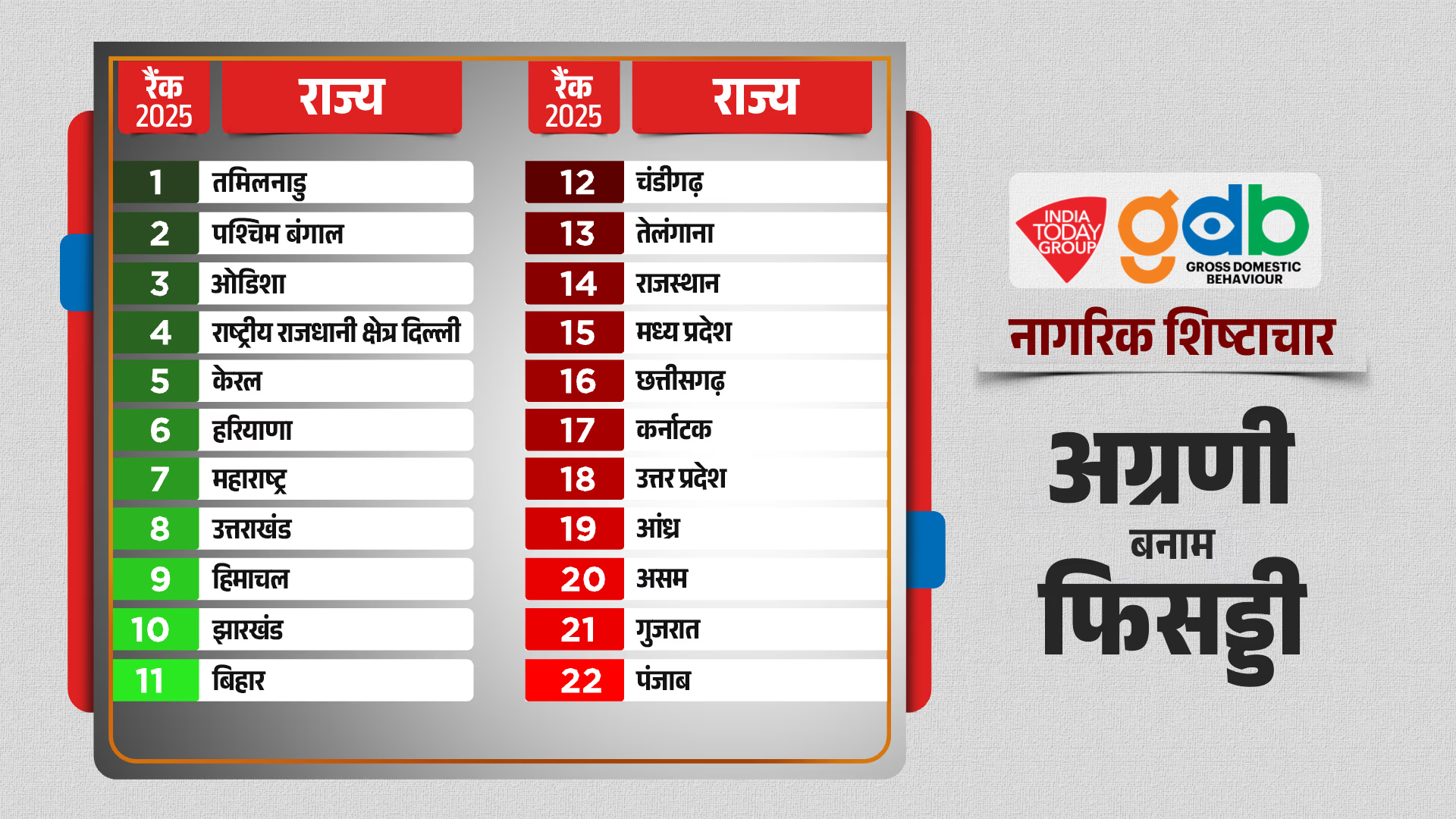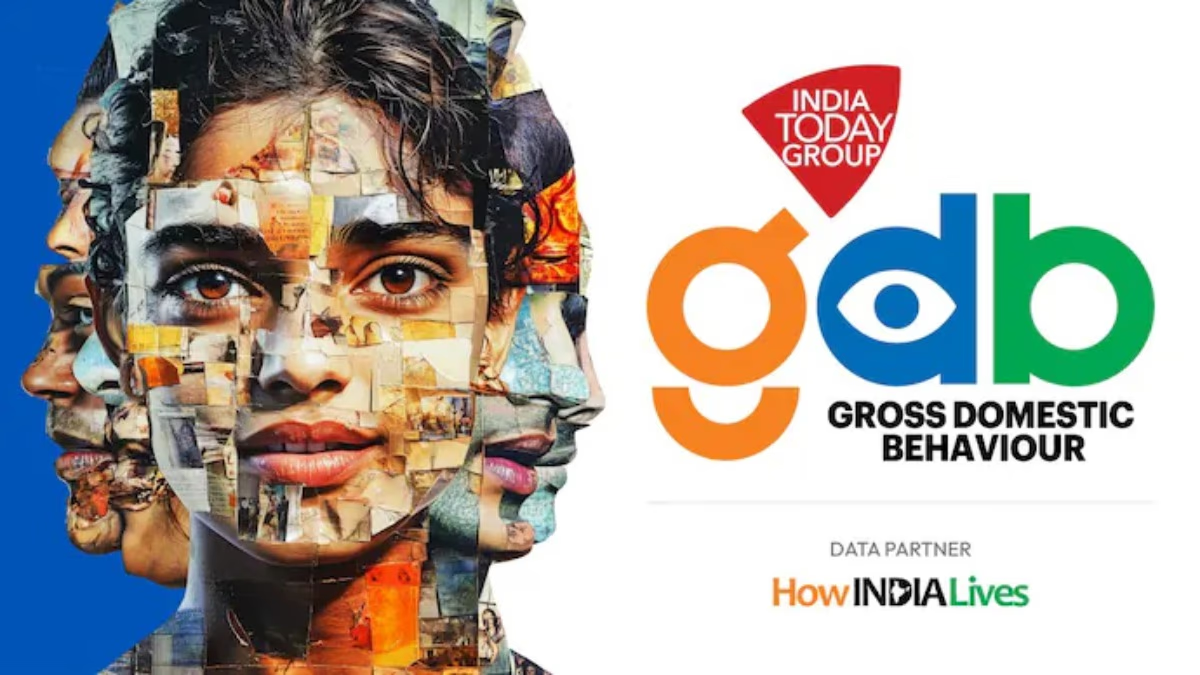As India strides towards becoming an economic superpower, how developed is our citizen consciousness? Is our societal fabric strong enough? Are we confident in our security as we transition from a developing nation to a developed one? Or do caste, religion, or gender bias still dominate our private and public decisions?
While a lot is said about the nation's GDP, we also need to measure where we stand in terms of GDB—Gross Domestic Behaviour. To uncover the state of affairs across different regions, India Today Group partnered with the data analytics firm 'How India Lives' to conduct a pioneering public opinion survey. Covering 21 states and a union territory, the survey engaged 9,188 individuals, focusing on civility, empathy, and integrity rather than income or property.
Leading in citizen etiquette, public safety, gender attitudes, diversity, and discrimination, Kerala and Tamil Nadu topped the rankings, followed by West Bengal, Maharashtra, and Odisha. Unfortunately, Uttar Pradesh, Punjab, and Gujarat ranked lowest at 22nd, 21st, and 20th positions, respectively. Madhya Pradesh emerged 19th, while Karnataka clinched 18th spot among the top underperforming states.

Source: aajtak
The results were concerning: 61% are willing to pay bribes, 52% find cash transactions a good way to avoid taxes, and 69% believe men should make final decisions in household matters. Around half of the population opposes interfaith or inter-caste marriages. Data reveal that economic improvement hasn't translated into better citizen behavior, equality, or social responsibility.
The survey created a healthy competition among states by ranking them on four aspects based on their perceptions:
- Civic Etiquette (Participation in community activities and adherence to public rules) - Public Safety (Trust in law and perceptions of personal security) - Gender Norms (Evaluation of women's roles and equality) - Diversity and Discrimination (Analysis of prejudices related to caste, religion, and regionalism)
The insights offer a mirror to a geographically diverse society undergoing transformation, where traditional values coexist with modernizing forces. Differences from progressive Kerala to traditional Uttar Pradesh highlight several truths about citizen behavior, each linked to different development realities. It's promising that a spirit of reform and solid intentions is on the rise. For example, following a spitting incident in the Uttar Pradesh Assembly, the Speaker banned gutkha and paan masala, imposing a fine of 1000 rupees for violations.
The survey data shows that 85% consider traveling without tickets in buses or trains wrong. Yet, in 2023-24 alone, 3.6 crore cases of ticketless travel were recorded by Indian Railways, resulting in fines of 2,231.74 crore rupees.
Other concerning patterns emerged, such as readiness to bribe for services. According to Transparency International, Denmark, Finland, Singapore, and New Zealand are among the least corrupt countries globally. While their combined population equals that of Punjab, India, they rank high in per capita income, with Singapore and Denmark in the top 10. This isn't just a coincidence; transparent systems reduce transaction costs, encourage investment, and ensure resources reach their intended destinations.
The digital payment revolution shows how rapidly citizen behavior can change. Now, 76% prefer digital payments over cash, with Delhi leading at 96%. The survey also uncovers contradictions, revealing the underutilization of women in the workforce in India. While 93% believe daughters should have equal educational opportunities as sons, and 84% support women working outside the home, these progressive views coexist with patriarchal undercurrents.
Still, 69% believe men should make ultimate decisions in household matters. Although 83% say it is wrong for a husband to beat his wife, 14% of women think otherwise, illustrating the entrenched patriarchal values. This issue is as much cultural as it is an economic compulsion.
Furthermore, the survey reveals that while 86% feel safe using public transport, gender biases produce fear. Restricted mobility for women in urban India over safety concerns exacts a substantial economic toll. One startling statistic shows that 84% claim they would report violent crimes to the police, but the actual rate of filing FIRs, like for theft, remains extremely low at only 7.2% in cities like Delhi.
Perhaps the most significant discoveries of the survey relate to diversity and discrimination. With 70% comfortable with neighbors from different religions, and 60% opposing religious discrimination in employment, there’s a promising shift in the right direction. Nonetheless, strong opposition to interfaith and inter-caste marriages persists: 61% object to interfaith unions and 56% oppose inter-caste marriages.




